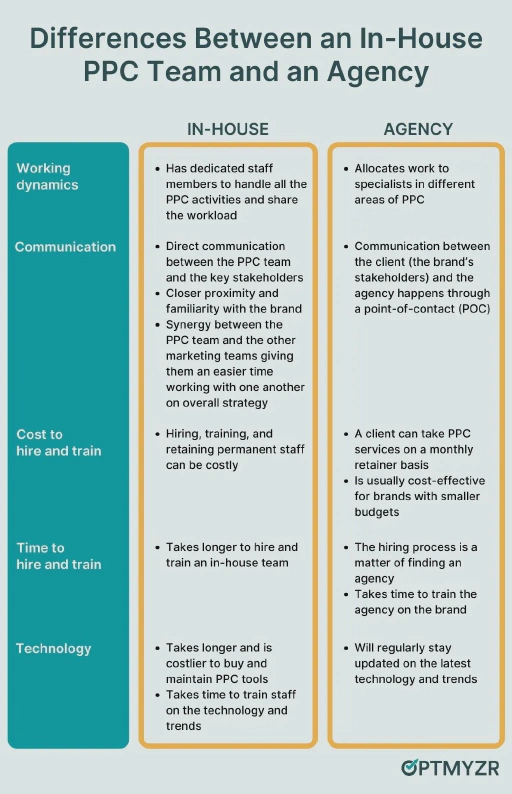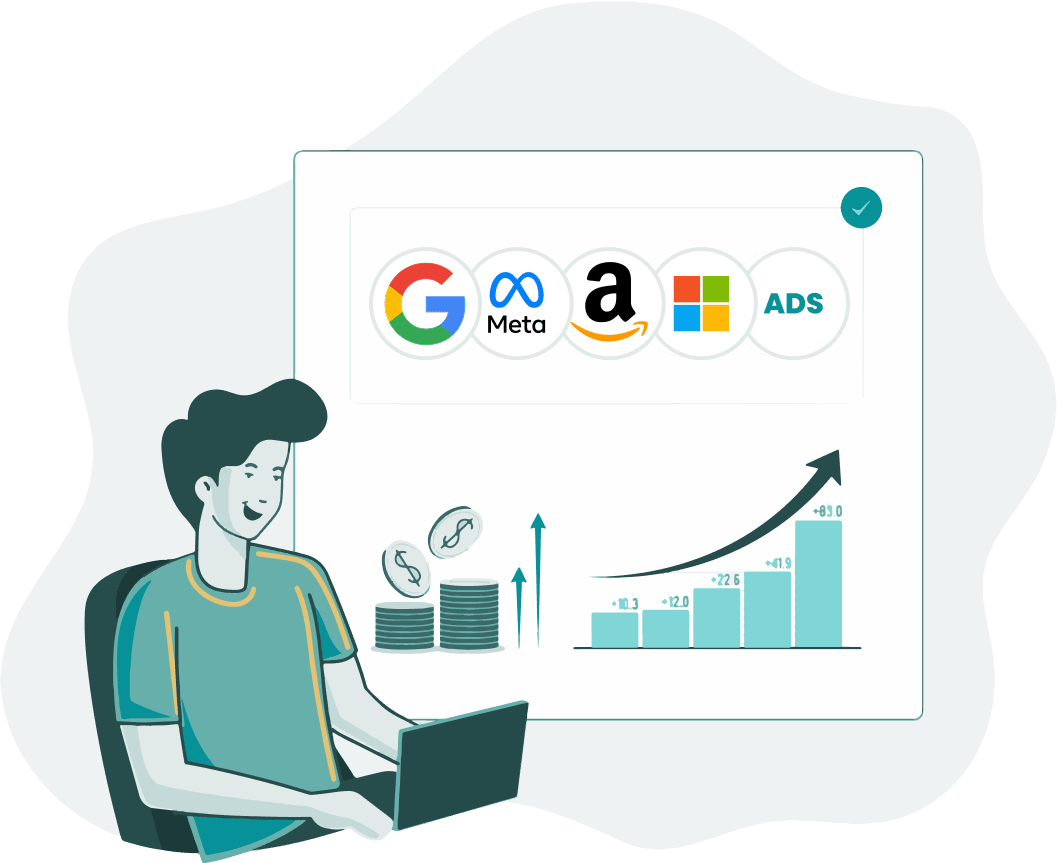If online advertising plays a significant role in your growth strategy, it might be advisable to consider your own in-house PPC team.
Running an in-house PPC team gives businesses greater control over their PPC operations — from high-level strategy to details such as ad copy.
Another big reason why some businesses — especially bigger ones — build their own PPC teams is that in-house teams tend to have a deeper understanding of their business since they spend their full time working on just one business.
Before learning how to build your in-house PPC team, it’s essential to understand the differences between an in-house PPC team and an agency, and when to choose what.
Differences between in-house PPC and agencies, and when to pick each

>
</picture>
Jannick Andersen, Traffic Manager at Proshop, points out some more differences stemming from his experience.
“My experience is that communication and time-to-market are a lot faster in-house. We are very satisfied with our agency (which currently has a more advisory/supportive role), but after we started our in-house team, we have both been able to run many more campaigns and have faster time-to-market.
After we started our in-house PPC team, PPC has become more important strategically. Meaning bigger budgets, more focus from management, and bigger interest from other departments.
When you do PPC through an agency, there’s a risk that it isn’t really on the radar in the company apart from a few key stakeholders who are in contact with the agency.”
Now that you’ve understood the core differences between the two, it’s time to know when you should pick one over the other.
When should you pick a PPC agency?
- You want to quickly expand and scale PPC marketing.
- You can’t afford to hire and train full-time staff.
- You want or need PPC specialists running your account.
When should you build an in-house PPC team?
- You want full transparency and greater control over your PPC activities; a dedicated team working solely on your brand.
- You want complete ownership of and security for your data.
- You want better communication between your stakeholders and the PPC team.
- You can afford to hire and retain permanent staff.
- You have access to good PPC talent.
- You are certain you’ll invest in PPC for a long period.
- You have access to technology and industry contacts.
Adding a bit more advice for marketing leaders building in-house PPC teams is Marin’s Anu Adegbola, one of PPC Hero’s top 25 experts for 2021.
“In the early days, there’s a lot of planning of what will happen in the transit.
It’s also important to know about access – what access level you have, what access level your team has, and where to go to remove unwanted access when you transit. And, timing is very important; you don’t want to make the transit during a time of the year when it’s going to be very busy for your business.
I won’t say there is much difference with moving your PPC operations in-house, just that you are a lot closer to the data and will need to lean on your in-house team instead of your agency team.”
How to build an in-house PPC team
Like Rome, in-house PPC teams aren’t built in a day. But with this three-point framework, you should be able to create a roadmap.
Create an advertising strategy.
Picking your strategy is the first step of making magic happen with PPC in-house. Don’t try to move ahead without a solid plan of action that’s in alignment with your overall marketing strategy.
Here’s a 5-step process to help you out.
1. Define your goals and what you want to achieve through PPC.
Whatever your goal is, it should tie directly to your business objective. Some of the more common goals companies have include:
- Lead generation
- Added sales and revenue
- Grow website traffic
- Increased brand awareness
2. Identify your target audience.
How well you identify your audience heavily influences the success of your ad campaign. If you don’t get your audience targeting right, you might cast too wide a net and burn through your budget.
So how can you get your targeting right?
If you’ve run campaigns in the past, gather insights from them and see what worked for you. Similarly, learn more from past sales and other marketing activities. They can be excellent sources of information.
If you’re new to PPC or haven’t had any past success with identifying your target audience, you can perform the following exercise:
- Conduct customer discovery calls every month along with your PPC team.
- Speak to 5-10 potential customers and really listen to what they say. Make sure that your advertising team is on the same page during this activity.
- Fine-tune your advertising efforts to address the insights and pain points that emerge from those conversations.
The more you do this, the better your targeting becomes. It gives you a clearer picture of your audience’s characteristics — demographics, psychographics, interests, fears, etc.
3. Choose the ad platforms.
PPC is a broad category that includes a variety of ad formats and ad platforms.
- Ad formats include search, display, video, shopping, email, etc.
- Ad platforms include Google, YouTube, Microsoft, Amazon, Facebook, etc.
Based on the audience insights you gather in the previous step, you can understand where they spend their time. Target those platforms. A tool like SparkToro is a great way to find this information.
4. Create and run the ad campaign.
You got your audience targeting and ad platforms set. The next things to do are build your landing page, create your campaign, and take it live. Showcase your unique selling proposition well, write compelling ad copy, and launch your campaign.
5. Analyze your results and optimize your strategy.
Once you run an iteration of your campaign, you’ll see how your ads have performed, which keywords are working, and so on. Be sure not to judge too soon — most campaigns require a few weeks to gather statistically significant data, while using automation like Smart Bidding means you’ll need a threshold of ~50 conversions.
Gather those metrics and analyze them. On a basic level, here are the most important metrics you should consider:
- Impressions/Views: Number of times your ad is shown to people you’ve targeted.
- Click-Through Rate: Percentage of people who see your ad and click on it.
- Cost Per Click: The amount you’re paying every time someone clicks on your ad.
- Cost Per Acquisition: The amount you’re paying to get a conversion. It might take multiple clicks to get a single user to convert.
- Conversions: The number of people who’ve taken your desired action, such as purchasing a product or submitting a form.
- Conversion Value: The worth of a given conversion, usually expressed as a currency amount.
- Quality Score: Unique to Google Ads, this score identifies how relevant your ads and landing pages are to user queries.
- Return On Ad Spend: The amount of conversion value generated divided by the total amount spent.
Focus on those metrics that directly affect your goals. For example, if sales are your primary goal, focus on Cost Per Acquisition, Conversions, and Return On Ad Spend. If brand awareness is your goal, focus on impressions and views.
The purpose of analyzing your results is to optimize your campaign to improve its performance.
Assemble your PPC Avengers.
In-house PPC teams look a bit different for everyone, depending on the size and needs of your business. But before you hire anybody, you should first know what kind of PPC experts you need.
If Google is your top channel for generating traffic, it makes sense to hire a Google Ads specialist. If you see that most of your audience spends their time on Facebook, look for a Facebook Ads specialist.
You may even hire a team of specialists if you have various categories of products to run campaigns for that you feel will be an excessive amount of effort on one person.
Remember that whatever channel is important to you, it’s important that your first hires have some experience under their belts.
In some companies, an in-house PPC team works alongside other departments. The SEO team helps with keyword research, the copywriting team helps with ad copy, the design team helps with creatives, and the PPC team takes on the role of optimizing the campaigns and reporting the results to the management.
One other skill you should look out for when hiring a PPC specialist is how well they can leverage past campaign performance data for future campaigns. The person should be able to make use of the past data — maybe by working with your engineering or data analytics team — to bring better results in the future.
You should also make sure that your team is constantly in the know about the latest PPC industry trends and updates to bring fresh ideas to the table.
Gianluca Binelli of BoosterBox has this to say about keeping up with PPC industry trends:
“Don’t forget to build a window on the outside world. It is a structured modus operandi to keep a close eye on the industry and can be done through conferences, external speakers, agency consultants, and more. There are so many smart people beyond your in-house PPC team who could share their views with you and expand your bubble of genius. It’s key that the team you’re building is exposed to new ideas and different perspectives. This is crucial for their continuous professional development, bringing fresh and innovative ideas to the table, increasing the quality of the work and talent retention.”
A summary of what you might look for when hiring your initial PPC team includes:
- Proven ability to execute a PPC strategy
- Strong technical advertising skills
- Experience with third-party PPC management software (like Optmyzr)
- Ability to work with cross-functional teams
- Analytical and communication skills
- Creativity and a willingness to learn
- Recognized PPC certifications are nice too, but rarely necessary
Deploy tools and software to make things smoother.
If you have experience running a large-scale PPC campaign, you may notice that much of your time goes into routine and repetitive tasks. Spending that precious time and manual effort on such tasks can not only be tedious but can take away your focus from other important things that need your attention.
Many agencies leave such tasks in the hands of PPC management tools, and for a good reason.
For instance, Optmyzr’s Shopping Campaign Builder can launch 2 campaigns with 14 ad groups in just 23 seconds, while the same task takes up to 10 minutes to complete using the regular Google Ads editor.
Just to clarify, these tools are not an alternative to the ad platforms. They only add an extra layer of functionality to help you get the most value out of your ad spend while saving on many resources.
Now, some PPC managers shy away from using automation tools because they are skeptical about the results. But what you have to understand is that as your business picks up the pace, scaling your advertising efforts will be extremely important.
In such cases, PPC automation will become inevitable. For that, there’s automation layering solutions like Optmyzr.
Here’s one more thing to keep in mind: when you start using such a tool, you may be tempted to apply automation to your entire process. But what you should do is carefully select only those areas where automation makes sense and invest your time in areas like copywriting, optimization, and performance analysis that cannot otherwise be handled by the tool.
And before you shop for any PPC management tool, you need to understand one crucial thing: what questions should I be asking the different vendors that provide PPC management tools?
Aaron Levy, Tinuiti’s Group Director of SEM, lays out 3 important questions below:
1. How does this tool make things better for me?
2. What does it do that other tools can’t?
3. What’s my return on investment?
Bonus questions to ask vendors:
- How flexible is your tool provider? What kind of support will you get?
- What’s the product roadmap?
- Are you looking for a piece of software or a back-end process?
While the list of questions you could ask a PPC software provider can be endless, these are some of the more critical ones to consider. Focus on the needs and goals of your organization, keep your personal goals as a marketer in mind, and assess and analyze at length to make an informed purchase.
Most of all, be ready to ask some hard questions of software developers — and be prepared to walk away from something that doesn’t fit your needs. Software is not just about cost, but the value it provides and whether the two of you are a good fit together.
Here’s one more great piece of advice from Jannick Andersen about avoiding common mistakes when running an in-house PPC team.
“I have always found that putting PPC efforts in perspective compared to other channels is a good strategy – usually, the ROI and scalability are the biggest selling points.
Having worked both in-house and in an agency, I think one of the biggest advantages in agencies is having lots of specialist colleagues and a variety of clients. So, it’s easier to test hypotheses, new features and be inspired by colleagues, and see what works on various clients.
Depending on the company, an in-house PPC team is typically smaller. That’s why there’s a bigger risk of getting caught in a loop of doing things the same way over and over again.
So don’t be afraid to challenge the status quo. Try to always stay on top of things. Experiment often. Reach out to your PPC network for any help. Read blogs and attend conferences (but ALWAYS have critical thinking), and try to do things better and more efficiently.”
Conclusion
Having your own in-house PPC team comes with a lot of benefits. But look out for common pitfalls. If your marketing leaders don’t have PPC specialization or expertise, reach out to an experienced consultant to assist you with the migration.
Remember that it takes time to set up a good in-house team. With the right strategy, team, and tools by your side, you can produce excellent results.
Get actionable PPC tips, strategies, and tactics from industry experts to your inbox once a month.









